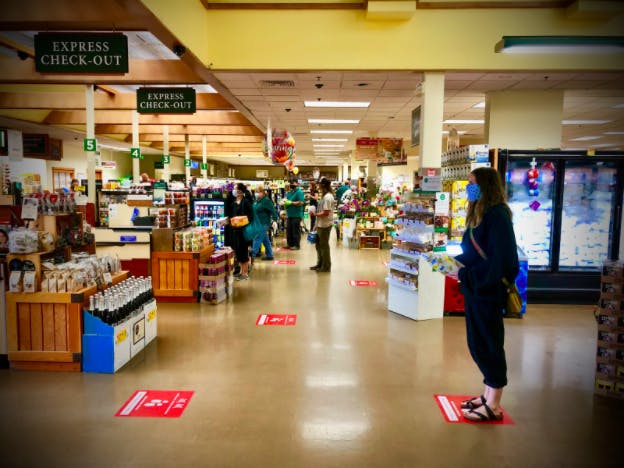
View different perspectives on essential jobs during COVID-19 crisis in Bellingham
As the infamous COVID-19 sweeps millions of people of their nonessential jobs in a global pandemic, Bellingham grocery store workers remain employed while serving the distressed community.
Fairhaven Haggen hired part-time employee Zoe Wuester one month ago for sanitation purposes, Wuester said.
“There is general upkeep 24/7,” Wuester said. “My main job is to keep the place clean; I’m constantly holding cleaning chemicals. We mostly clean the shelves, carts and baskets.”
Haggen employees are screened every day before their shift, followed by a series of questions regarding if employees feel any COVID-19 symptoms, Wuester said.
Fairhaven Haggen employees receive a hazard pay of a few more dollars an hour for compensation, Wuester said. '
“It’s a way of thanking employees for coming to work,” Wuester said. “If we weren’t getting [the compensation pay], people would be frustrated. They’re happy to be appreciated.”
James McCafferty, director at Western’s Economic and Business Research Center, said a raise in minimum wage for Bellingham workers is highly unlikely.
“Any job that doesn’t have high requisite skills behind it can only escalate wages to where the consumer is going to pay for the product,” McCafferty said. “If consumers are having a hard time with high [food] prices, the provider cannot charge more for the product.”
As the center projects the economic forecast of COVID-19, the cost of labor in retail does not have a lot of margin, McCafferty said.
“If consumer demand is high, then more workers are needed,” McCafferty said. “Part of the challenge in the labor market is that you can only be paid as much as the next person that wants your job.”
Big businesses like Amazon have the situation where their demand has surged so high that their wage has been raised $2 an hour, McCafferty said. However, smaller businesses like Haggen, which has 15 locations throughout Washington, is giving a small compensation pay at the moment, Wuester said.
Joe Franklin, assistant manager of the Fairhaven Haggen, said the most challenging part of the COVID-19 transition has been staffing.
“We can’t count on who is going to be here any day,” Franklin said. “Employees must stay home if they have any symptoms at all.”
Haggen corporate has advised an “abundance of precautions,” including requiring all crew members to wear masks and wash their hands every hour, Franklin said. Each department has a checklist to see if all of their checkpoints are sanitized throughout the day, he said.
Inside Haggen, there is plexiglass and four decals at every checkout that enforce the global six feet rule, Franklin said.
In addition, Haggen has hired a “greeter,” someone who sanitizes shopping carts and basket handles while talking about social distancing policies with customers, Franklin said.
“A lot of customers like seeing people cleaning,” Wuester said. “It reassures them that we’re doing what we can.”
According to Wuester, the biggest part of working at a grocery store during the pandemic is being careful because you don’t know who is immune compromised.
“There are people grocery shopping for their neighbors,” Wuester said. “If you’re at risk, there are people out there willing to help.”





